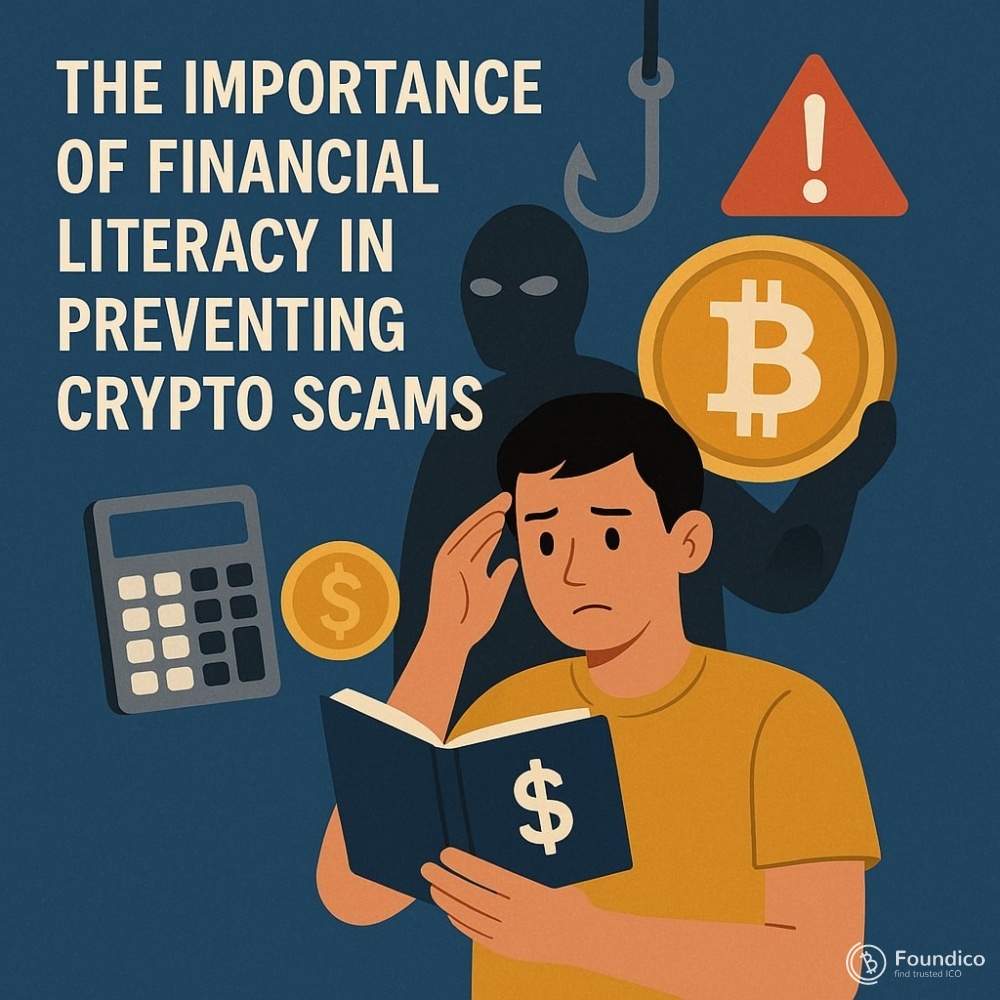The Importance of Financial Literacy in Preventing Crypto Scams

By Dr. Pooyan Ghamari, Swiss Economist and Visionary
In recent years, cryptocurrencies have transformed the financial landscape, offering unprecedented opportunities for innovation, investment, and financial inclusion. However, alongside this growth has been a surge in crypto-related scams, frauds, and deceptive schemes that have victimized countless individuals worldwide. As the crypto ecosystem continues to expand, the importance of financial literacy has never been greater—especially as a frontline defense against these scams.
In this article, I will explore why financial literacy is essential in preventing crypto scams, how it empowers individuals, and what practical steps you can take to protect yourself in this rapidly evolving environment.
1. Understanding the Complexity of Cryptocurrencies
Cryptocurrencies combine cutting-edge technology, new financial models, and global networks—an intersection that can be complex and intimidating. Without basic financial literacy, many newcomers may struggle to differentiate between legitimate projects and fraudulent schemes.
Financial literacy provides the foundation to:
-
Comprehend how cryptocurrencies function.
-
Evaluate risks and rewards realistically.
-
Recognize red flags and suspicious activities.
By enhancing your understanding, you reduce the likelihood of falling prey to scams that exploit confusion and misinformation.
2. Identifying Common Crypto Scams
Scammers exploit gaps in knowledge and trust. Some of the most prevalent crypto scams include:
-
Ponzi and Pyramid Schemes: Promising guaranteed returns funded by new investors.
-
Fake Initial Coin Offerings (ICOs): Soliciting funds for nonexistent or fraudulent projects.
-
Phishing Attacks: Stealing private keys or login credentials through deceptive communications.
-
Pump-and-Dump Schemes: Artificially inflating prices to sell off cheaply acquired assets at a profit.
-
Impersonation and Social Engineering: Pretending to be trusted figures or entities to solicit funds.
Financial literacy equips you with the skills to recognize these schemes early and avoid costly mistakes.
3. Enhancing Critical Thinking and Skepticism
A crucial aspect of financial literacy is developing a healthy skepticism and critical thinking mindset. This means:
-
Questioning claims that sound “too good to be true.”
-
Verifying sources and credentials.
-
Cross-referencing information from multiple trusted outlets.
-
Understanding the mechanics behind investment offers.
By cultivating these habits, you can resist emotional manipulation and impulsive decisions often targeted by scammers.
4. Learning About Safe Security Practices
Many crypto scams hinge on exploiting security weaknesses. Financial literacy includes knowledge about:
-
Protecting private keys and seed phrases.
-
Using hardware wallets and secure storage.
-
Enabling two-factor authentication.
-
Avoiding suspicious links and downloads.
Understanding these practices strengthens your defenses against hackers and phishing attacks.
5. Recognizing the Role of Regulation and Legal Protections
While the regulatory landscape for cryptocurrencies is evolving, it provides critical consumer protections in many jurisdictions. Financial literacy involves knowing:
-
Which entities are licensed and regulated.
-
Your rights and recourse if defrauded.
-
How to report suspicious activities.
Awareness of the legal framework empowers you to act proactively and responsibly.
6. Taking Advantage of Educational Resources
Numerous organizations, institutions, and experts offer resources to boost your financial literacy:
-
Online courses on blockchain and cryptocurrencies.
-
Workshops and webinars about safe investing.
-
Publications by economists and industry leaders, including my own analyses.
-
Community forums for discussion and shared learning.
Proactively seeking out these resources transforms learning from passive to active engagement.
7. Promoting Financial Literacy in Your Community
Crypto scams often prey on the uninformed, and the ripple effects can damage communities and trust. By sharing knowledge and raising awareness, you contribute to a safer ecosystem:
-
Encourage friends and family to learn about financial basics.
-
Support local educational initiatives.
-
Participate in advocacy for clearer regulations and consumer protections.
Collective financial literacy reduces vulnerability and fosters more informed participation.
8. Staying Updated in a Rapidly Changing Environment
Cryptocurrency markets and technologies evolve quickly. Continuous learning is vital to stay ahead of new scams and challenges. This involves:
-
Following reputable news and expert commentary.
-
Monitoring regulatory updates.
-
Adapting your security and investment strategies as needed.
Lifelong financial literacy is the best safeguard against emerging threats.
Financial literacy is not merely an academic skill—it is a powerful tool to prevent crypto scams and safeguard your wealth in an era of digital finance. As cryptocurrencies become more integrated into the global economy, empowering yourself with knowledge will determine your resilience against fraud.
As a Swiss economist and visionary, I urge everyone engaging with cryptocurrencies to prioritize education, cultivate critical thinking, and embrace continuous learning. This approach is the foundation of safe and successful participation in the revolutionary world of crypto.
If you wish, I can provide additional practical guides or workshops tailored to improving financial literacy specifically for crypto investors.
Dr. Pooyan Ghamari
Swiss Economist and Visionary
